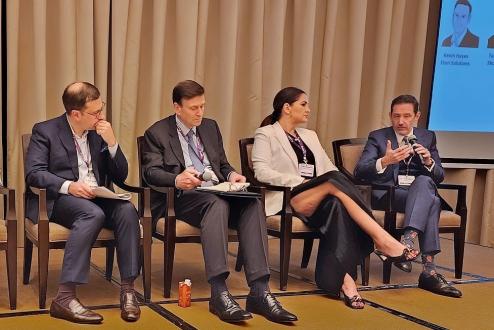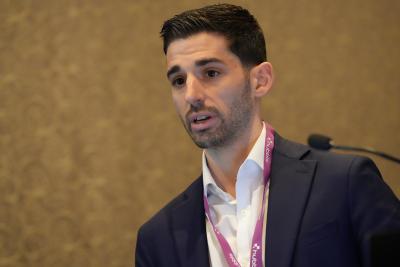Setting up a Family Office – Issues, Challenges & Solutions

Mar 30, 2023
Hubbis is delighted to report that we held a remarkably successful one-day Family Office Forum in Singapore on February 9, in exclusive partnership with US headquartered family office advisor and solutions provider Eton Solutions. The event was sub-titled ‘Creating & Operating a Modern, Efficient and Fit-for-Purpose Family Office’ and brought together speakers and attendees from Single-Family Offices, Multi-Family Offices, private banks, independent wealth firms, trustees, lawyers, accountants, consultants, immigration specialists, regulators and other experts from the wider family office and wealth management ecosystem.
The first panel discussion of the day saw a remarkable array of expertise assemble to consider some or all the following questions:
- Why do you want a family office, and how do you go about deciding on the location and the structure?
- How do trusts link to or complement the family office?
- What are the key regulatory and tax issues to consider?
- How do you create and then manage the family and corporate ‘governance’ aspects?
- How do you bring in/hire the right talent and what is the right balance between family and external experts?
- What typically goes wrong?
- Who is creating the family offices of today and tomorrow and what are the different nuances, for example between sponsors/founders from Europe, the US, SE Asia, North Asia and so forth?
- How do you assemble the right external legal, accounting, fiduciary, banking, IT/FinTech and other expertise?
- How long should it all take to get fully up and running from initial inception?
The Panel of Experts:
Chair:
- Kevin Hayes, President of Eton Solutions#
Panellists:
- Tan Woon Hum, Partner, Head of Trust, Asset & Wealth Management Practice, Shook Lin & Bok
- Roxanne Davies, Partner, Proprietary Capital Holdings
- Dr. Silvio Struebi, Partner, Simon-Kucher & Partners
- John Shoemaker, Registered Foreign Lawyer, Butler Snow
- Carolyn Leng, Managing Director, Bordier & Cie
Key Insights & Observations
A family office is often driven by the needs and expectations of the next generations
A banker reported how quite often in their experience in Asia, the founder generation will look to the second and more often even the third generation for their impetus to create a family office. “I see that sometimes the second generation is somewhat bypassed, and the third generation is there to coax and encourage the transition,” they reported.
As to timing, it is often when the family wealth and family are larger and more global that the founders then focus more intently on matters of legacy, succession and devising the right structures to preserve and distribute the family wealth for the future generations.
They explained that the investment aspects are relatively that much easier than ensuring the right structures and compliance from all aspects. The families must manage the transition from family structure to a more formalised and rigorous legal structure.
Structures should be fit for purpose and the founders should have clarity of mission
A lawyer explained how the most straightforward structure in Singapore, for example, would be a company structure holding an investment account, with the company a simple Singapore corporation, a Singapore non-resident company, or possibly a Variable Capital Company (VCC), which was introduced during the pandemic. You can then add more sophistication, for example with an associated fiduciary structure.
“There can be great advantages from a tax and estate planning perspective from wrapping a family office and the fiduciary structure for intended US beneficiaries down the road,” he reported. “For other jurisdictions that may not work.” He added that in some cases, traditional trusts are replaced by the types of foundations used often in the European markets. “And I imagine it will not be long before we see the first family office held in a life insurance wrapper, even though that has not yet happened,” he said.
He stated that the chosen structure must suit the family and be fit for purpose. He said there are plenty of people like himself, across a variety of jurisdictions, and across a variety of professions that can provide these insights and also knowledge to family offices, and then help ensure the structures hold up under jurisdictional and regulatory scrutiny.
The family office must also be the right vehicle to preserve and increase wealth for families
Another perspective came from a senior investment professional with a multi-decade experience in running family offices and UHNW departments within private banks, and who arrived in Singapore in 2011 to establish and run the Asian arm of a 900 year old European family based out of Switzerland, and who now runs a licensed investment management company in Singapore, to manage family assets.
She explained that she cautions people against using structures just for tax as changes always occur in government policies and thinking, and advises the creation of a global structure that allows for flexibility and adaptability.
“But my focus is the investment side, with the real end goal of the family office to preserve and grow wealth over time and to make some strategic investments over the years into certain specific geographies, or sectors, or industries,” she reported.
Governance is also a key component of success, as the family office is there for the founder and for the future generations. Processes, technology and procedures are also central to the proposition, as data needs to be easily available and transparency around disclosure and communication is a must.
She highlighted how there will be differences between the generations, with founders usually preferring a high degree of control, and the younger generations perhaps more focused on ESG and philanthropy, which has long been a key area of focus for the long-established, larger and wealthier families, many of which like to have a foundation within their structures.
She added that good communication and the closeness of families across the generations and family tributaries and geographies will help ensure how well the family wealth is maintained over the generations. She said it is challenging if there is not really a common thread and common unity in spirit in the family. “You need to have dialogue, and you have to be close knit as a family, if you want to manage the structure well,” she stated.
Devising and evolving the right governance and compliance for a successful family office
A lawyer explained that in Singapore if the family office is a true single family office, not a multi-family office, the regulation is relatively light and you do not need a license from the Monetary Authority of Singapore (MAS). But before setting up shop in Singapore, he said sponsors have numerous issues to deal with, from account opening, client due diligence, KYC, AML, then issues over employment passes for any foreign talent they might want, then many reporting and disclosure matters to handle once operational and so forth.
He explained that for those sponsors that want access to Singapore tax and other incentives such as under 13O or 13U, conditions must be fully met initially and then fully adhered to throughout the months and years ahead. He cautioned that any changes in the structure, or shareholding, and other changes could all impact on the incentives and taxation as well as on other areas.
Reporting is vital and access to real-time data essential. “You need the expertise of a really good COO, the right professionals, the right team, and also to external support and expertise,” he advised. “You have to think ahead and start planning, and we often tell our clients not to look short term to medium term, but to look medium to long term. Laws always play catch-up, and family offices also need to be aware and proactive enough to see what is coming along, what changes are going to affect them.”
The importance of drilling down to the nuances of objectives and preferences with your clients
An expert explained how it is vital for advisors and bankers and others in the broader wealth management community to understand their family office sponsor clients and as much about their families as possible.
For example, she reported that North Asian Chinese are very different often from Southeast Asian ethnically Chinese clients. “We may look similar, but we behave and think very differently,” she reported. “In Hong Kong, I have come across a family where they give nothing at all to their female heirs, whereas in Southeast Asia, there is none of that type of practice, everything is far more equal or sometimes even in favour of the female family beneficiaries.”
She commented that one of the biggest headaches is often around how they draft up their governance and internal guidelines, to be efficient and transparent, but also to allow for good functionality. She said the governance also needs to allow for viewpoints from the different generations and potentially different arms of the family.
She indicated that the governance element is crucial and that if this is not properly constructed from the outset, problems will very problem arise. She said this is even more vital and also complex when Muslim families are involved, potentially with several wives and different families of the patriarch to combine effectively.
In general, she said that the governance must be well drafted but also retain some flexibility. “The governance cannot be completely airtight,” she said. “It has to be flexible enough, with some room for manoeuvring. For example, the family might have remarkable businesses but then none of the next generations want to take over, so they need to sell up later. You have to have leeway to allow for such eventualities, and then potentially for the management and/or distribution of the sale proceeds to family members. In fact, one of the biggest challenges for us as bankers, is in transitioning entrepreneurs and owners into giving up control and putting the right structures in place.”
Another expert agreed, adding that all these nuances have to really be understood by all the service providers, be it bankers, asset managers, trustees, lawyers, accountants, structurers, and others.
Smart and robust governance will help ensure proper and well-expedited investment management and also day-to-day operations
Another speaker explained that governance is also essential for creating the right approach to investments and risk management. He added that you must also ensure you have the right team of specialists in the family office and the right protocols in place.
A guest agreed, adding that it is vital to make sure the family office is staffed with genuine expertise and that there is careful attention paid to hiring high-quality and relevant talent, and building the right technology to support the team and the operations.

President at Eton Solutions

More from Kevin Hayes, Eton Solutions
Latest Articles
Wealth Solutions & Wealth Planning
Investment Migration, Residency & Citizenship – Key Trends Relevant to HNW and UHNW Private Clients






